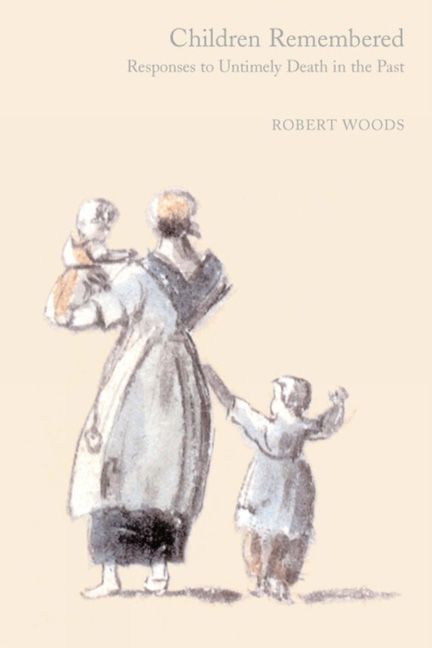Book contents
- Frontmatter
- Dedication
- Contents
- List of Tables
- List of Figures
- List of Illustrations
- 1 Introduction: ‘the lines of life’
- 2 Après la mort des enfants
- 3 Mortality, Childcare and Mourning
- 4 Children in Pictures and Monuments
- 5 Emotions and Literature
- 6 Poems, Mainly of Child Loss
- 7 The Vocabulary of Grief
- 8 Parallel Histories: Experience and Expression
- Acknowledgements
- Notes on the Sixty-Nine Poems
- Notes
- Select Bibliography
- Index
2 - Après la mort des enfants
- Frontmatter
- Dedication
- Contents
- List of Tables
- List of Figures
- List of Illustrations
- 1 Introduction: ‘the lines of life’
- 2 Après la mort des enfants
- 3 Mortality, Childcare and Mourning
- 4 Children in Pictures and Monuments
- 5 Emotions and Literature
- 6 Poems, Mainly of Child Loss
- 7 The Vocabulary of Grief
- 8 Parallel Histories: Experience and Expression
- Acknowledgements
- Notes on the Sixty-Nine Poems
- Notes
- Select Bibliography
- Index
Summary
Philippe Ariès (1914–84) has provided many highly original perspectives on the history of the family and on attitudes to death in the West. While he is remembered most for the latter, his contribution to the new history of childhood has proved remarkably influential in both France and the English-speaking world. For historical demographers there is a special interest in his ‘parental indifference hypothesis’ and the behavioural conditioning that low infant survival chances may have engendered in the past. The development and continuing popularity of such a hypothesis provides us with a useful device for the exploration of childcare and parent–child relations in general. Ariès will be our ‘straw man’. But he worked in an intellectual climate that gave particular attention to different concepts of time, especially la longue durée, as well as to the distinctions between ideologies and mentalités. While his approach was always to view change in the long term, oft en over several centuries, and to explore what had previously been little-used sources (family portraits, funeral monuments, cemeteries), several other French historians proved themselves to be more adept in their discussions of wider philosophical and methodological issues. Michel Vovelle (1933–), in particular, has not only taken the discussion of mentalités further, but he has also offered one of the most influential quantitative analyses of the ways in which attitudes varied and changed during the long term. Vovelle's version of the ‘threelevels model' will be introduced here as a way of broadening Ariès's parental indifference hypothesis and of providing some order for subsequent chapters. In at least one important respect Ariès and Vovelle are unlikely companions, coming as they do from different ends of the political spectrum, yet their insights on the histories of dying, death and mortality still demand attention. Their boldness challenges; their inventiveness stimulates, and their neglect surprises.
Ariès, parental indifference and l'histoire de la mort
L'enfant et la vie familiale sous l'Ancien Régime(1960), translated as Centuries of Childhood (1962, 1973), contains Ariès's most sustained contributions to the history of the family and of childhood.
- Type
- Chapter
- Information
- Children RememberedResponses to Untimely Death in the Past, pp. 7 - 32Publisher: Liverpool University PressPrint publication year: 2006



